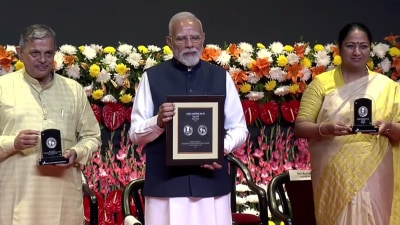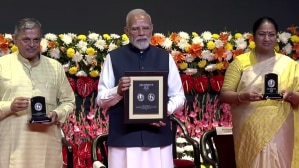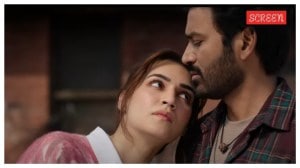Click here to follow Screen Digital on YouTube and stay updated with the latest from the world of cinema.
Express at Berlinale: Past Lives is a meditative film about love, lingering loss and acceptance
If Celine Song’s Past Lives allows men and women to break out of gender expectations, John Trengrove’s Manodrome holds out an olive branch to the kind of alpha men who use the gym as a place of validation.
 Past Lives is in competition at the 73rd Berlinale.
Past Lives is in competition at the 73rd Berlinale. If there’s one question many people are faced with at recurring points, is the what-if one, and the most asked one has to be, what if you had chosen another person to share your life with? Celine Song’s ‘Past Lives’, in competition at the 73rd Berlinale, after wowing critics at Sundance, uses it as a peg to hang a film about love, lingering loss, and acceptance. Growing up is not for the faint-hearted.
Nora’s (Greta Lee) family migrates from S Korea to Canada when she is old enough to have memories of her friend Hae Sung (Teo Yoo): the two are constant companions, walking to school together, but she is so competitive that she breaks into tears the one time she comes second. That she will always come first for him, is an inescapable irony that the film both underlines and mines most beautifully.
We come upon them many years later when Nora has moved again, this time to New York, and Hae Sung discovers her via Facebook: turns out he remembers her as Na Young, her Korean name which her parents changed to Nora for easier assimilation in an alien country and culture. They start chatting online, but the potential nature of that all-consuming connection is brought to a deliberate halt: Nora draws back, taking off to an art residency where she meets Arthur (John Magaro), a Jewish writer on the verge of becoming a published author, and soon they are married, living in a tiny flat in East Village.
Some years later still, with Hae Sung in New York for work, the two finally meet. Their meeting takes place in a park, harking back to their last one which was classified as a ‘date’ by Nora’s mother but was clearly more a playdate, with their two mothers watching over them. They hang back, uncertain about the protocol, and then Nora takes the first step forward, to draw Hae Sung into a hug: he is at first tentative, hands by his side, and then we see him slowly relaxing into her embrace. They walk and talk, as they used to, and later, recounting that meeting, she tells Arthur how Hae Sung is ‘so Korean’, and how, with him she felt so Korean, and yet not. Arthur sees her, animated in a way she isn’t with him; he’s on the outside, looking in.
So there’s your triangle, but not your standard Bollywood one whose plot would begin nudging one of the men into an overtly melodramatic ‘sacrificial act’. Song, whose debut feature this is, creates astonishingly vulnerable men who are able to express themselves to the other in a lovely scene at a bar where the three fetch up. It’s natural for Arthur to feel resentment and jealousy for Hae Sung, but he chooses not to act upon those impulses. There’s restraint and respect, and it’s mutual. It’s this third act which makes this film so special, where we see this trio teasing out the strands which have entangled them, seeing which way the wind blows.
If Song’s film allows men and women to break out of gender expectations, John Trengrove’s ‘Manodrome’, also in the competition section, holds out an olive branch to the kind of alpha men who use the gym as a place of validation, riding the homoerotic currents of a place doused in testosterone. When sullen New York taxi driver Ralphie (Jesse Eisenberg) scowls darkly at his rearview mirror, you almost think he’s on the verge of askin’ if we’re talkin’ to him. His heavily pregnant wife (Odessa Young) is about to deliver, and Ralphie finds himself getting more and more alienated not just from her, but from the world around him, lured away by his new messiah (Adrien Brody) who runs a cult for men to ‘reclaim their masculinity’.
‘Manodrome’ may have wanted to be thought-provoking, and Eisenberg pitches in a terrific performance as a man searching for an anchor. But it becomes, in its ambivalence towards these men, nothing but a toxic exercise.


- 01
- 02
- 03
- 04
- 05
































